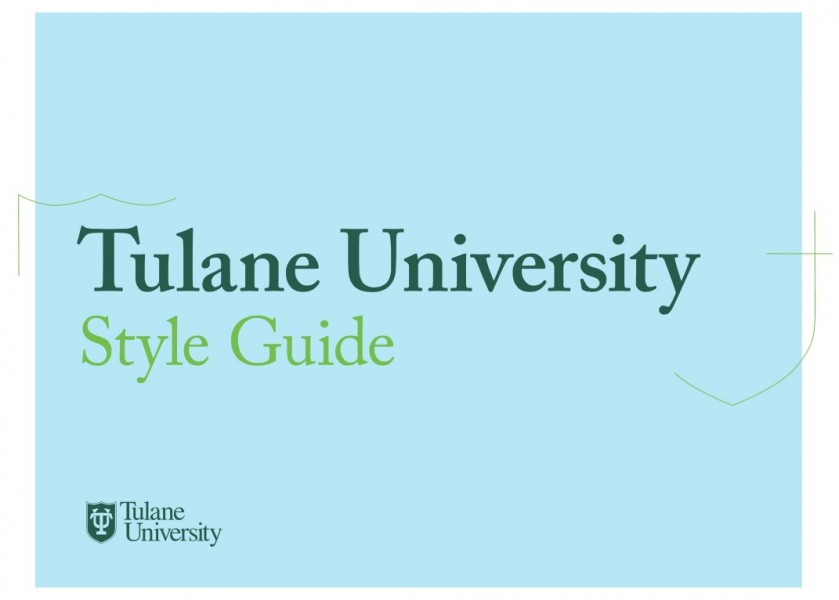What does it mean to be a Tulanian?: A look at Tulane’s branding campaigns
What does it mean to be a Tulanian — or at least, what does Tulane want it to mean?
The school’s own messaging and branding rules, which are laid out in its Style Guide, might provide the clearest answer.
Tulane Communications and Marketing collaborated with an outside firm called Ologie to develop the Style Guide, according to Assistant Director of Marketing Aryanna Gamble. Ologie is a marketing firm that frequently does work for universities.
“The brand guidelines help give us all a baseline common language and identity,” Gamble said. “I hope that the brand messaging platform and guidelines give the Tulane community a shared sense of pride in what makes Tulane great — all the important work people across the University are doing to change the world.”
These guidelines range from rules regarding the proper use of the Tulane logo — shield and wordmark together are preferred — to more abstract statements regarding the proper voice and tone for the University.

Certain elements, such as the collection of shield abstractions and framing corners, will be instantly familiar. Others, such as the core message, will never be printed in an external communication but are still present to some degree in every publication.
According to the Tulane style guide, a core message is a “concise articulation of our role in the world.”
“At Tulane University, we address problems of dramatic proportions so we can improve the human condition,” the guide says.
With this lens, it is no surprise that the school chose to use the release of the Sexual Assault Climate Survey results as a moment to launch the “Wave of Change,” a campus-wide series of events designed to change the culture of sexual violence.
The ideas presented in the guide have parallels to the reality of campus life. Community service became a core element of Tulane’s mission after Hurricane Katrina devastated New Orleans. The University then created Outreach Tulane, the school’s main day of service, which served as a way for students to assist in the cleanup and recovery.
“Katrina had a profound impact on messaging in that immediately after the storm, we worked to dispel myths about the state of New Orleans and Tulane as well as convey the unique experiences that students would have attending school during New Orleans’ rebuilding and recovery,” Director of Strategic Recruitment Leila Labens said.
While Tulane’s messaging has since shifted to emphasize more traditional aspects of the school’s offerings, elements of post-Katrina initiatives remain ingrained in the campus community.
“Tulane is a community where we help each other,” Meredith Smith, assistant provost for Title IX and clery compliance, said at an Aug. 21 training event for Wave Leaders.
According to the guide, Tulane believes that its students “stand apart.” At this year’s Welcome to the Wave, an event aimed at introducing first-year students to campus, Director of Admission Jeff Schiffman told first-year students they can achieve all the greatness they want at Tulane — but they do not have to do it in the same ways as everyone else.
“Tulane is a community where the unexpected is expected, where we’re unafraid to stand out.”
Tulane is a school that stands apart from other institutions in many different ways. Tulane is the only university in the country to have transitioned from public to private. It is the school that discovered a pair of three-thousand-year old mummies in a storage closet underneath the old Tulane stadium. It is a school that’s been featured in raunchy comedies, serious biopics and potentially everything in between.
Perhaps the greatest articulation of what Tulane thinks of itself is the following, taken directly from its brand materials: “Tulane is a community where the unexpected is expected,” the web page reads. “Where we’re unafraid to stand out. Where we look to stand for something, especially if it protects and preserves the most vulnerable people, places, and things on our planet. We look to solve emerging issues that will one day affect us all. And we raise one helluva hullabaloo while doing it. Tulane is a place where being different is how we make a difference. In so many ways, we stand apart.”
Leave a Comment
Your donation will support the student journalists of Tulane University. Your contribution will allow us to purchase equipment and cover our annual website hosting costs.
















cathy c hightower • Sep 10, 2018 at 9:00 am
“Tulane’s mission after Hurricane Katrina devastated New Orleans” is inaccurate. The flood failure of the Army Corp of Engineeers federally designed and built levees and flood walls devastated New Orleans. If Tulane had an engineering department, their mission could be to oversee flood protection.